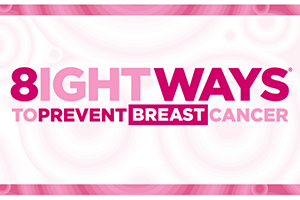
Breast cancer. Just reading those words can make many women worry. And that’s natural. Nearly everyone knows someone touched by the disease.
2. Be physically active
Exercise is as close to a silver bullet for good health as there is, and women who are physically active for at least 30 minutes a day have a lower risk of breast cancer. Regular exercise is also one of the best ways to help keep weight in check.
3. Avoid too much alcohol
Alcohol can be good for the heart, but when it comes to cancer, there’s really nothing good about it. Even moderate amounts increase the risk of breast cancer. In general, if you drink moderately (no more than one drink a day for women), the overall health benefits of drinking outweigh the risks. But if you don’t drink, don’t feel that you need to start.
4. Breastfeed, if possible
Breastfeeding for a total of one year or more (combined for all children) lowers the risk of breast cancer. It also has great health benefits for the child.
5. Avoid birth control pills, particularly after age 35 or if you smoke
Birth control pills have both risks and benefits. The younger a woman is, the lower the risks are. While women are taking birth control pills, they have a slightly increased risk of breast cancer. This risk goes away quickly, though, after stopping the pill. The risk of stroke and heart attack also is increased while on the pill – particularly if a woman smokes. However, long-term use also can have important benefits, like lowering the risk of ovarian cancer, colon cancer and uterine cancer – not to mention unwanted pregnancy – so there’s also a lot in its favor. If you’re very concerned about breast cancer, avoiding birth control pills is one option to lower risk.
6. Avoid postmenopausal hormones
Postmenopausal hormones shouldn’t be taken long term to prevent chronic diseases, like osteoporosis and heart disease. Studies show they have a mixed effect on health, increasing the risk of some diseases and lowering the risk of others, and both estrogen-only hormones and estrogen-plus-progestin hormones increase the risk of breast cancer. If women do take postmenopausal hormones, it should be for the shortest time possible. The best person to talk to about the risks and benefits of postmenopausal hormones is your doctor.
7. Find out your family history
Women with a strong family history of cancer can take special steps to protect themselves, so it’s important for women to know their family history. You may be at high risk of breast cancer if you have a mother or sister who developed breast or ovarian cancer (especially at an early age) or if you have multiple family members (including males) who developed breast, ovarian or prostate cancer. A doctor or genetic counselor can help you understand your family history of the disease.
8. Tamoxifen and raloxifene for women at high risk
Although not commonly thought of as a “healthy behavior,” taking the prescription drugs tamoxifen and raloxifene can significantly lower the risk of breast cancer in woman at high risk of the disease. Approved by the FDA for breast cancer prevention, these powerful drugs can have side effects, so they aren’t right for everyone. If you think you’re at high risk, talk to your doctor to see if tamoxifen or raloxifene may be right for you.
Washington University School of Medicine’s 2,100 employed and volunteer faculty physicians also are the medical staff of Barnes-Jewish and St. Louis Children’s hospitals. The School of Medicine is one of the leading medical research, teaching and patient-care institutions in the nation, currently ranked sixth in the nation by U.S. News & World Report. Through its affiliations with Barnes-Jewish and St. Louis Children’s hospitals, the School of Medicine is linked to BJC HealthCare.
Siteman Cancer Center, the only National Cancer Institute-designated Comprehensive Cancer Center in Missouri, is ranked among the top cancer facilities in the nation by U.S. News & World Report. Comprising the cancer research, prevention and treatment programs of Barnes-Jewish Hospital and Washington University School of Medicine, Siteman is also Missouri’s only member of the National Comprehensive Cancer Network.